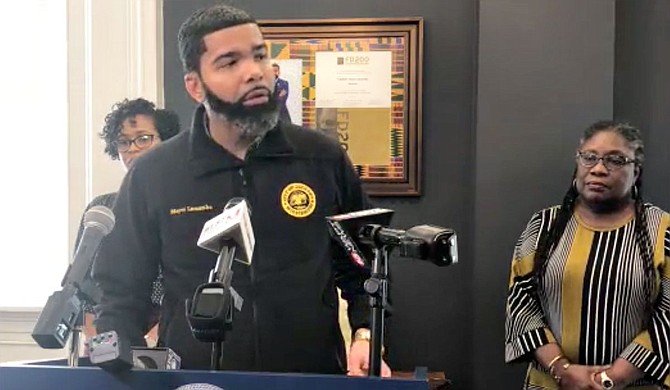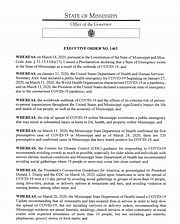Mayor Chokwe A. Lumumba reiterated to Jackson residents Thursday that the City of Jackson’s ban on gatherings of 10 or more people and limitations on local restaurant operations, as part of efforts to curb the spread of COVID-19, are still in place. Stock photo courtesy City of Jackson.
Mayor Chokwe A. Lumumba reiterated to Jackson residents Thursday that the City of Jackson’s ban on gatherings of 10 or more people and limitations on local restaurant operations, as part of efforts to curb the spread of COVID-19, are still in place.
“All Jackson residents, please be advised that the guidelines set forth in the executive order that I issued on behalf of the City of Jackson last week, prohibiting gatherings of 10 or more people and limiting restaurant service to take-out, delivery or drive-thru only are still in effect,” Lumumba wrote in a Facebook post on March 27.
“The decision to mandate such restrictions was not one that was taken lightly and serves to protect the people of Jackson as much as possible,” he added.
COVID-19 Information Mississippians Need
Read breaking coverage of COVID-19 in Mississippi, plus safety tips, cancellations, more in the JFP's archive.
On March 24, Gov. Tate Reeves signed an executive order that explicitly overruled local orders designed to mitigate the spread of COVID-19 if they conflicted with the governor's statewide version, which Mayor Lumumba's did not do. The order drew criticism from local and national politicians and media for potentially undermining the measures that some local elected officials in the state had already implemented to keep residents safe.
Mayors Can Limit Non-'Essential' Businesses, Operations Only
At a press conference on Thursday, March 25th, and in a clarifying order released later that confirmed his earlier language, Reeves made it clear that his executive order can override local orders, especially on any actions that conflict with his long list of “essential” businesses that are exempt from social-distancing requirements. Local governments do not have the right to limit any businesses and operations anywhere he has deemed as “essential,” or the travel back and forth to get to “essential” workplaces.
“As Mayor of the City of Jackson, I have the authority to implement these restrictions,” Lumumba continued in his statement. “After discussion with Governor Tate Reeves, we have mutually agreed that his order serves as a minimal standard for the state of Mississippi and cities have the right to implement more restrictive policies than that stated by the governor’s order.”
“I implore everyone to follow this mandate for the health and safety of our citizens and to follow the recommendations of the CDC,” Lumumba wrote.
Reeves said that he had spoken to several mayors who had issued orders that had closed restaurants and other non-essential small retail businesses and had clarified that their actions did not conflict with his order.
The governor's original order and its amendment make it clear that local leaders would not have the authority to close or limit "essential" businesses. Department stores, offices, factories, car dealerships, or shopping malls are all exempt from Reeves' 10-person social-distancing whether or not they are consider "essential." (The confusion in the order about that list is explained here.)
Priester: ‘We Need a Uniformity Around the State’
Ward 2 Councilman Melvin Priester Jr. stressed the urgency of a unified approach in Mississippi to effectively deal with the COVID-19 crisis. Though he praised the leadership and residents of Jackson for implementing some of the strictest measures in Mississippi, he pointed to the futility of fighting the spread of a virus if other municipalities in central Mississippi and throughout the state do not follow similarly strict measures.
“I’m very appreciative of the local business communities coming together and closing down. A lot of people are staying home from work, and so I’m just really appreciative of what they’re doing,” Priester said about Jackson’s efforts to address the pandemic in a March 27 phone call.
Priester added, however, that closing orders needed to be consistent throughout the Jackson metropolitan area. “Unfortunately, I think Jackson is in a real bind, because we need to have centralized agreements between Jackson and all the surrounding communities to all do the same things. It doesn’t do us any good if we close things down and other places are still open,” the councilman said.
“My hope is that sooner rather than later, we’ll see from the governor and our surrounding communities just a uniform agreement for what central Mississippi will do,” Priester said. “I think Jackson has been one of the most consistent and firm places about trying to shut things down. But we need a uniformity around the state that is similarly firm.”
Council President Virgi Lindsay of Ward 7 echoed Priester’s concerns in a phone call today. Lindsay, who said she had long worried about the virus spreading to Mississippi, is concerned that the discrepancies between state and local executive orders have caused confusion for residents.
“I think anytime there are confusing messages, that is a danger. Because, really, we all need to be united in ... working to prevent a widespread pandemic in our state,” she said, noting that curbing spread in Jackson, the most populous city, was important.
“The potential is there for any community to be impacted, but still anytime you’ve got a greater city of people, the potential is there for more cases and it spreading more quickly in a community. I’m grateful that there’s been some clarity about what different individual cities can do,” Lindsay added.
Still, she said, “I think the lack of cohesive planning is a danger.”
Lindsay pointed to the proximity of Jackson to neighboring Louisiana, where Mississippians may travel to and from for work or leisure. In Louisiana, 2,746 people have tested positive for COVID-19 and 119 have died. Many of the infections occurred in New Orleans, where the virus is known to have infected 1,170 people as of press time.
“It’s not just our state. Jackson is not that far from New Orleans. I mean, we really need to be communicating as a nation,” Lindsay said.
Yusef Salaam Warns Hinds, Mississippi About COVID-19 Risks Behind Bars
As Jackson and Hinds County resisted changes in arrest policy, a member of the Exonerated 5 explained to Seyma Bayram what they could face without them.
Upcoming: City Council to Vote on Borrowing $40 Million
On Tuesday, March 31, the city council will vote on whether to borrow $40 million in bonds for infrastructure needs. The money, which will come from future proceeds of the 1% sales tax commission, will go toward a variety of infrastructure projects, including road paving and water-sewer repairs. Residents can stream the council meeting on the City of Jackson’s website and Facebook page.
Lindsay, who expressed concerns about the impact of COVID-19 on Jackson’s economy, is also concerned about how the pandemic will hit the bond market. “The concern I have is the impact that this could have on a municipality’s ability to sell bonds. I don’t know when the bond market will become viable again,” she said.
“I think it is very important that we move forward with this, but I also know given the current instability of the overall economic landscape in the country, that we need to be ready to move when we can on the bond market, so we can actually access this money,” she said.
Lindsay pointed out that the funds would not only fund the infrastructure projects, but also go towards hiring people to carry out that work. “That will be a small stimulus ... employment package that we certainly can use right here in the city,” she said.
*UPDATE: The above story is edited to reflect confusion around a list of businesses Gov. Tate Reeves included in his executive order that are exempt from social-distancing requirements. Reeves' staff contends that not all of those exempt businesses are also considered "essential." A story published after the above piece, "Fallout of Tate Reeves’ Executive Order: Department Store Roulette, Scared Associates," explains the confusion about the clause in his order including departments stores, offices and factories in detail.
Email City Reporter Seyma Bayram at [email protected] and follow her on Twitter at @seymabayram0.
More stories by this author
- City Announces Robinson Road Repaving Project; Stay-At-Home Order Still in Effect
- City of Jackson Sues Canadian National Railway Over Blocked Railroad Underpass
- Mayor Lumumba Revises, Extends Jackson Stay-at-Home Order
- Mississippi Justice Institute Sues Mayor Lumumba for Open-Carry Order
- Jackson Attorney with COVID: ‘A False Sense of Protection Here’





